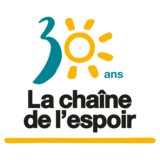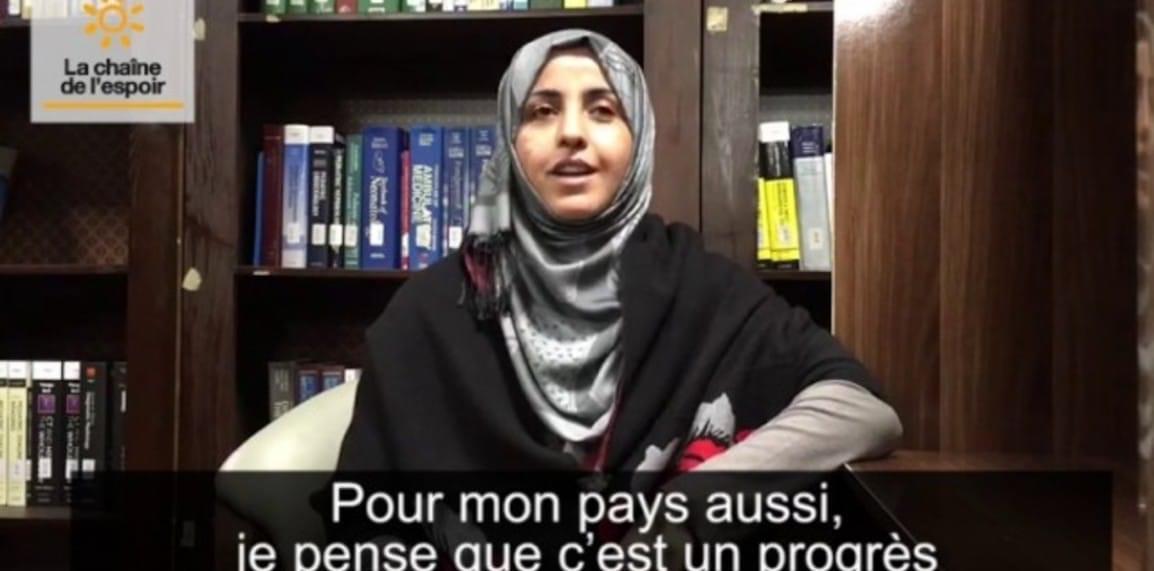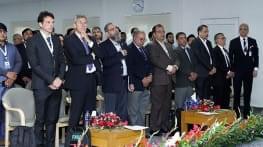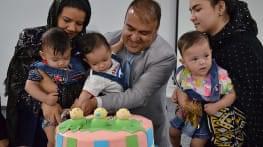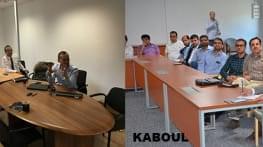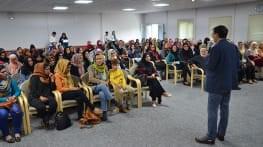Women in Afghanistan
Interviews from Kabul
Ms Dunya M., 28 years old, born and lives in Kabul
Resident in paediatric surgery for 4 years - Graduated in March 2017
At five, I already wanted to be a doctor. It was my only dream and I had no other plan. I don’t know where it comes from as there was no doctor among my relatives. The year I applied to Kabul Medical University (KMU), there were 40,000 applicants for only 40 places and competition was really tough. After seven years at KMU, I passed the exam of the Minister of Public Health (MoPH) and two exams at the French Medical Institute for Mothers & Children (FMIC). I was shortlisted at FMIC with Yalda.
I am thankful to FMIC and happy to be part of an international organisation. I have had a lot of opportunities and I have learned what I wanted. I have published two papers. In February 2016, in Jaipur (India), I received the award of the best young scientist for the best oral presentation among 100 participating countries.
I went to the USA to present my work on the “Tubeless repair of oesophageal atresia and tracheoesophageal fistula: new highlight in previews procedure at the French Medical Institute for Mothers & Children, Kabul, Afghanistan” at WAFOPS 2016 (World Federation of Associations of Pediatric Surgeons). I took part in all the events, presentations, projects, etc. organised at FMIC. I did my best and my efforts have been appreciated at the FMIC.
>> Is it fundamental that Afghan physicians, and especially ladies, are trained?
In the Afghan society, people think that Ladies are not qualified for that. It proves that gender equality still has a long way to go. I have to make efforts to prove that all medical fields, and especially paediatric surgery, are possible for women too. Women can do it! Most of the ladies choose gynaecology and obstetrics because they don’t receive much support in the other fields.
>> La Chaîne de l’Espoir, what does it inspire you?
Before coming here, I didn’t know what it was. It is a great opportunity to work at FMIC, with La Chaîne de l’Espoir. Families, patients and doctors enjoy high quality facilities and equipment. Patients can benefit from free care and treatment in an appropriate structure. I was also lucky enough to work with foreign doctors on many occasions.
>> After I graduate
I will have to meet new challenges. I want to continue my studies, benefit from fellowships in sub specialities, especially in plastic surgery. Fellowships are available only abroad, in countries with better schools where I can learn more… After that I will work… It is my duty to work for my country and help out. I was able to study for free at KMU (government institution) during 7 years. It is now my turn to do something for my country.
>> Last words
Ladies’ journey in developing countries is not easy. The battle starts when you take the first steps out of home because there is a lot of mental pressure. It is not an easy life although it is not impossible… I carry on with my life. It is possible to achieve whatever we want but we need support and encouragement family. FMIC has always treated me the way I expected. No discrimination based on my gender.
Ms Lema H., 29 years old, born in Farah and lives in Kabul
1st year as Resident in paediatric medicine - Graduated in 4 years
I graduated from KMU two years ago. I love children and after giving birth my interest in paediatric medicine increased. The work load is huge and there is a lot of pressure between work and study. It is difficult but it is also a great opportunity for learning. I am fortunate because my family gives me much support. 1 year of Post-Graduate Medical Education (PGME) – opportunity to practice with the theory studied in university + interest for patients. I am learning how to manage my time.
>> Is it fundamental that Afghan physicians, and especially ladies, are trained?
It is a great opportunity for women’s professional development. Here, most of the girls/women are not entitled to any education. It is therefore important in view of the inspiration and encouragement that other people and relatives may bring.
>> La Chaîne de l’Espoir, what does it inspire you?
It makes a good contribution and shows a great commitment. It is important to continue in the same way, to have more skilled people here in Afghanistan. It generates an enormous feeling of hope for our country.
>> After I graduate
I want to pursue my studies and get a sub-speciality in haematology and oncology. I hope one day we will be able to stop referring children to foreign countries. I also hope to be able to continue my education here in Afghanistan.
>> Last words
Being a woman in Afghanistan means being less fortunate. What is essential is the family support (husband, parents…). In the last 10 years, I have seen a change in mentality and it is becoming now OK to get an education abroad. It would be a great source of inspiration in the community, if people could meet more educated girls.
Ms Fariba A., 27 years old, born and lives in Kabul
2nd year in the paediatric surgery department – Graduated in 3 years
I have always wanted to be a doctor, it was my first choice from the beginning. Many female medical students have to study gynaecology and obstetrics – But I don’t like to be like everyone else, I wanted to be different. I have therefore decided to become paediatric surgeon. There is no work too difficult for women. If you really want to make it, you just need to have a project and go for it.
I have not faced many problems at school, university or during residency. I am grateful to my parents and my husband because they have been very supportive. They have helped me a lot. I have been recognized for my skills during several surgeries and I have been entrusted with more and more difficult cases, which encourages me to make further progress.
Today I am happy with the post graduate medical education, all the more if I compare with my other classmates at Medical University: we have classrooms, a library; hygiene conditions are excellent at the hospital with quality equipment and lab facilities; we have gowns, and we enjoy good sterile conditions, etc.
>> La Chaîne de l’Espoir, what does it inspire you?
The training is very useful, with a preference for practical training sessions. I admire your job in favour of children and especially in the field of plastic surgery.
>> After I graduate
I want to continue in the field of paediatric surgery. I am also interested in plastic surgery and laparoscopy but I haven’t made my decision yet.
>> Last words
Every woman has the right to get educated. It is up to men to give a better place to women but we also have a role to play.
Ms Yalda O., 28 years old, originally from Badakhshan but born and lives in Kabul
4th year in the paediatric surgery department – Graduated in March 2017
My mother always suffered for rheumatism and relieving her from her pain was my dream. I have always wanted to be a doctor. I love children so I have decided to train in paediatrics. FMIC is very safe for women. It is difficult for a woman to become a doctor but it is not impossible: once we have made up our mind, we must try to achieve our goals. Entry exams are difficult: 12 people applied for only 3 positions, one for Dunya, one for me and one for a man. FMIC was my first and only choice, simply because it is the best training centre compared with other government hospitals.
>> Is it fundamental that Afghan physicians, and especially ladies, are trained?
It is important to trust women, they have the same power and they can do as well as or even better [than men]. In gynaecology and obstetrics, there are enough women, which in not the case in the other fields. For example, in the last 20 years, only 3 ladies graduated in paediatric surgery.
>> La Chaîne de l’Espoir, what does it inspire you?
Hope for patients and doctors… It is very frustrating not to be able to help because of money. It is a good thing that La Chaîne can help us. I remember Dr José, we learned a lot with him, we were lucky to have such a great opportunity to learn!
>> After I graduate
I wish to continue in my field. I am planning to specialise in plastic surgery (1 year) and find a way to study abroad like India. I see many opportunities to progress in India. My family and even my husband are very supportive.
>> Last words
I have confidence in the Head of Department, FMIC and my colleagues. I have worked very hard to become a doctor with the indispensable support of my family. It is a great moment in my life because my dream as a child has come true.
Shabnam A–B., 28 years old, born and lives in Kabul
4th year in the pathology department – Graduated in March 2017
I was always interested in becoming a doctor. My family encouraged me and especially my father. I worked hard. I went to KMU, I passed the exam of the Minister of Public Health (MoPH) and then I chose surgery. FMIC announced the opening of Pathology as a discipline. Facilities cannot compare with those of foreign countries, but they are the best in Afghanistan. So, I took the FMIC exam and I chose pathology because there are only few doctors specialised in that field. I wanted to be the first female pathologist! Today I am happy: I know what research is.
I am now very competent in all the areas of pathology (microbiology, biochemistry, haematology, etc.).
>> Is it fundamental that Afghan physicians, and especially ladies, are trained?
In Afghanistan, training at FMIC is the best option. Abroad training conditions are even better but FMIC is a quality education centre. Culture remains a barrier here for women: most of us have no other choice but to specialise in gynaecology and obstetrics. Female students are not always aware of the other disciplines.
>> La Chaîne de l’Espoir, what does it inspire you?
It is a very nice and very efficient organisation for post-graduate training programme and access to healthcare for needy people. We hope that La Chaîne de l’Espoir will bring over other pathologists to us so that we can learn even more.
>> After I graduate
I will stay at FMIC. I am the only female pathologist. It is therefore the best option. The other option would be to teach at KMU but for that you need to have a master degree or a PhD and to publish papers; to do so I need to have a fellowship to specialise in microbiology.
>> Last words
I am proud of my husband because he supports me and helps me… I enjoyed being a student, being with classmates, friends, all that. And also above all I have a passion for learning. For me, there were no other options than the ones I chose.
Marzia M., 24 years old, born in Ghazni (Jaghoori) and lives in Kabul
1st year in radiology – Graduated in 2020
As you know, the sharing of medical knowledge lies at the core of our missions and values. Training practitioners, and more particularly women, is essential to accompany developing countries on their way toward autonomy. We have met Marzia M., one of the doctors engaged in a 4-year course in radiology at the French Medical Institute for Mothers & Children (FMIC). She tells us more about her motivations and ambitions.
>> Why did you decide to follow this training at FMIC?
I came to Kabul in 2015 after graduating from a renowned medical institute of Pakistan where I spent the most part of my life as a refugee. My earnest passion was to help Above all, I want to help the people of my country, particularly the most deprived and subjugated gender in Afghanistan, i.e. females (my country, but also women). If I have chosen diagnostic radiology to revoke the typical stereotype that females can only excel in the field of obstetrics and gynecology and to encourage other female doctors to pursue what they believe in and not in what people decide for them. Here at FMIC, I have found a place where I am encouraged to have chosen this field and we all work collaboratively for improving the foundation of diagnostic imaging here in Afghanistan.
>> According to you, why is it essential to train female doctors in Afghanistan?
As female doctors are not provided equal opportunities like males in Afghanistan, I think more concerted attention should be paid to training of female doctors. This can build a very strong foundation in delivery of quality health care. I would suggest that female doctors should be provided more opportunities here in French Medical Institute for Children to help build the very infrastructure of health services and the four year residency program is one step towards its establishment. Besides, the conservative milieu of Afghanistan is such that female patients feel more comfortable while giving detailed history related to their health problems to female doctors which I think is very important in making precise diagnosis and it also points to the importance of female doctors in all fields of medicine. Besides, I think that every woman should have the possibility to get a quality education let alone better training chances to female doctors. For me, education and health are two fundamental pillars if we want to offer Afghan people, women and children in particular, a better life. I pray the situation in Afghanistan improves in terms of education and health and I am very optimistic in this regard as the quote goes by “ Hope is a good thing may be the best of things and no good thing ever dies ”.
>> Where do you picture yourself after you graduate?
I am thirsty to improve my skills and I will try to avail chances where and when I can. After graduation, I plan to move to Jaghoori (Ghazni) where I can be of any service to the inhabitants of my town where I hail from. And, because people from that part of my country either visit Kabul or Pakistan to manage their health issues and most of them are financially deficient with no choice at all to get dignosed and treated. And, also encourage others particularly females to step up in the field of medicine and play their vital role. I want to help my people and my country as much as I can and I hope my dreams take form of reality.
